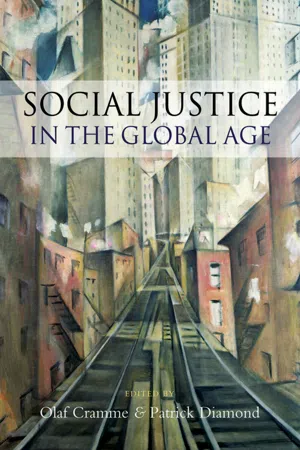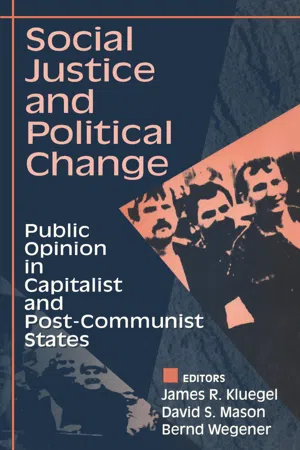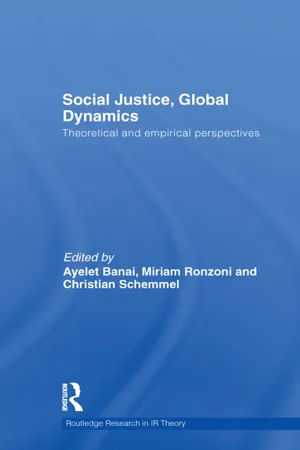Politics & International Relations
Social Justice
Social justice refers to the fair and equitable distribution of resources, opportunities, and privileges within a society. It aims to address systemic inequalities and promote the well-being of all individuals, particularly those who are marginalized or disadvantaged. This concept is often associated with efforts to combat discrimination, poverty, and other forms of social injustice.
Written by Perlego with AI-assistance
Related key terms
5 Key excerpts on "Social Justice"
- eBook - ePub
- Olaf Cramme, Patrick Diamond(Authors)
- 2013(Publication Date)
- Polity(Publisher)
This concludes my discussion of the conceptual question about social and global justice. But what now of the normative question? Are they conflicting values, and if so which is the more urgent? This will of course depend on how we understand each value. In line with my discussion up to now, I will assume that global justice should be understood as demanding the universal protection of human rights and fair terms of interaction between nation-states. Others may want to advance more demanding conceptions, for example some form of global equality. In the case of Social Justice, I assume that it embraces comparative principles such as equality of opportunity and equal access to medical care for those with similar needs. Interpreted in this way, it seems clear to me that these two values often do place conflicting demands upon us. At the most elementary level, if we assume that the global protection of human rights sometimes requires rich countries to make resource transfers to poor countries, then we as democratic citizens may have to choose between, say, increasing the foreign aid budget to promote global justice and increasing the budget for pre-school education to promote equality of opportunity at home. It is a debated question whether Social Justice is a satiable goal, in the sense that we might reach a point where there is nothing more that we can do by way of reallocating rights and resources between people that might make their shares of resources more distributively just. There is reason to think that it is not satiable, when we consider, for example, expenditure on health care, on disability, and indeed on measures to try to correct inherited inequality of opportunity. That is, there will always be more interventions that we might make that will have the effect of meeting medical needs more adequately, giving people with disabilities opportunities that are nearly the same as those enjoyed by the able-bodied, and correcting for the effects of inherited social position by, for example, intensive pre-school education for children from disadvantaged families. In each of these areas, and others, we could decide to put more resources into pursuing Social Justice, and there would always be at least marginal gains from doing so. Since GDP at any time is finite, however, these resources would have to come from somewhere: either other forms of public expenditure would have to be retrenched, or rates of taxation raised (but eventually, we should assume, the tax yield will fall if the rate rises beyond a certain point). If that is the case, then practical trade-offs between social and global justice are going to be with us indefinitely. - eBook - ePub
International Justice: Principles and Issues
Principles and Issues
- Tony Coates(Author)
- 2017(Publication Date)
- Routledge(Publisher)
The structure of the argument is as follows. First, some of the inherent difficulties with international Social Justice are briefly rehearsed. Secondly, there is an indication of the nature and importance of the issues of international Social Justice involved in the global warming problem and how their resolution depends on overcoming the inherent difficulties with international Social Justice. Thirdly, there is an assessment of how the existence of some kind of global political community might help in overcoming these difficulties. And, fourthly, this leads on to a consideration of the role of global democracy in bringing about such a community.1 Problems of International Social Justice
'Social Justice' is in effect a modern terra for the old idea of distributive justice. With Miller we can say that Social Justice concerns 'the distribution of benefits and burdens throughout a society' (Miller, 1976, p. 22). The inherent problems of the idea of international Social Justice concern the extent to which ideas of Social Justice may be inapplicable to the international realm where, it is held, there is no society or community.4 It is typically contended that, since it is constituted by sovereign states, the international realm, rather than itself being a society or community, is composed of various distinct and separate, societies or communities - indeed separate and independent political communities.Such problems are of course additional to those, both of form and content, associated with the very idea of Social Justice in the first place,5 Even within a domestic society both what is meant by 'Social Justice', and what is to be adjudged socially just when the meaning is agreed, are highly controversial matters which cross cut the considerations concerning the particular nature of international Social Justice. However, we do not have the space to take these matters up here, and we shall concentrate specifically on some aspects of the idea of international - eBook - ePub
Social Justice and Political Change
Public Opinion in Capitalist and Post-communist States
- David Mason(Author)
- 2018(Publication Date)
- Routledge(Publisher)
IJUSTICE IN POLITICAL PERSPECTIVE
Passage contains an image
2
Distributive Justice: Does It Matter What the People Think? 1
Adam Swift, Gordon Marshall, Carole Burgoyne, and David RouthThe International Social Justice Project (ISJP) is the first comprehensive sociological survey of popular beliefs about distributive justice. Based on a common research design and interview schedule, developed and fielded by colleagues working in twelve democratic capitalist and former state socialist societies, the study investigates attitudes toward a number of economic and political issues that are central to debates about Social Justice. In this chapter we report some early findings from three of the national surveys.2The new project is entering an already crowded academic arena. Indeed, interest in justice issues is such that the field boasts its own international journal, and supports a sizeable industry in textbooks and student readers.3 Fortunately, the political theorist David Miller has recently distilled the principal findings from the extensive literature into a pair of influential review articles (Miller 1991, 1992), and these provide a useful context for introducing this latest contribution to the debate.In the first of these essays, Miller examines the various theories of justice currently on offer, charting the differences between monolithic and pluralistic accounts; rights-based, meritorian, and egalitarian perspectives; and analyses rooted in the Aristotelian, Hegelian, and feminist traditions. However, sociologists will probably be more interested in his second article, an overview of what is now a substantial field of empirical research into public perceptions of distributive justice. Miller here uses the heuristic device of comparing justice in small-group contexts with justice across whole societies, on the one hand, and beliefs about justice (what people say is fair or just) with actual behavior (what they do when asked to allocate valuable resources) on the other. Much of the relevant work fits easily into the conceptual space defined by these twin dimensions of micro versus macro and attitudes versus behavior. Social psychologists have focused on behavior at the microlevel, exploring the factors that influence people to distribute rewards according to one criterion rather than another, at least in experimental situations involving small groups. By contrast, sociologists most commonly investigate popular judgments about the fairness of the distribution of resources across whole societies, normally by means of sample surveys. In their case it is beliefs about macrolevel distributions that are the focus of attention. - eBook - ePub
- Ayelet Banai, Miriam Ronzoni, Christian Schemmel(Authors)
- 2011(Publication Date)
- Routledge(Publisher)
3 Global Social Justice
The possibility of Social Justice beyond states in a world of overlapping practices Ayelet Banai, Miriam Ronzoni, and Christian SchemmelDOI: 10.4324/9780203819296-4Introduction
The claim that broadly egalitarian principles of Social Justice1 apply globally has been the focus of a far-reaching debate, recently described as “one of the most intense controversies in political philosophy” (Van Parijs 2007 : 638). Positions range from the view that principles of Social Justice apply exclusively within states to the altogether opposite contention that rejecting the global application of domestic principles of Social Justice means rejecting the fundamental moral axiom that all human beings have equal worth. Thomas Nagel, for example, opposes the global application of principles of egalitarian Social Justice, arguing that such principles are valid only within the framework of coercive state institutions of which we are putative joint authors (Nagel 2005 ). On the other hand, some versions of cosmopolitanism claim that any model short of global equality of some sort constitutes unjustifiable discrimination among individuals on the basis of morally arbitrary factors such as geographical location or citizenship (e.g. Caney 2001b ).In this chapter, we defend a particular approach to this debate, namely the practice-dependent method – which takes existing social and institutional practices to be constitutive of principles of justice – and explore some of its implications for Social Justice beyond state borders. We begin by locating the methodological problem within the global justice debate. We then explore the advantages of the practice-dependent approach over its practice-independent rivals. Finally, we argue that the practice-dependent approach, properly understood, yields a nuanced intermediate position between statism and global egalitarianism. - eBook - ePub
- Heather Widdows, Nicola J. Smith(Authors)
- 2013(Publication Date)
- Routledge(Publisher)
1 Global Social Justice
An introduction
Heather Widdows and Nicola J. SmithThis volume aims to provide a distinctive contribution to the growing debate about global justice and global ethics. The global justice debate is one of the key contemporary ethical debates. It is important not only in academia where it is increasingly dominant in moral and political theory as well as gaining prominence in law, sociology and public policy, but also in practical debates in the ‘real world’ in determining global policy and practice. Accordingly this book brings a multi-disciplinary voice – which spans philosophical, political and social disciplines – and emphasizes the social element of global justice in both theory and practice. Contributors to this volume come from a variety of disciplines, such as Political Science, Philosophy, Sociology and Law, in an attempt to ensure that the book does not just speak to some issues in the global justice debate (although it certainly does this), but also has something to say to the wider debates about how global justice should be conceived. In order to do this it explores a diversity of themes relating to global Social Justice including globalization, human rights, ecological justice, gender and sexuality, migration and trafficking, global health challenges and torture. In all chapters contributors have attempted to speak beyond their disciplines and to be accessible and relevant. The hope is that the sum of these chapters will be significantly more than their parts as they draw connections between themes and issues as well as across disciplines. The resulting volume is intended to map global Social Justice at its broadest and to move the academic debate forward as well as to help develop policies and practices which result in global Social Justice.The global justice debate has become increasingly prominent in academic, policy and activist circles. In academia this is, perhaps, most notable in the increasing emergence of global ethics as a discipline (Widdows 2005, 2008). Perhaps the most fundamental concern of global ethics is global justice. Core global ethics questions are; ‘what is justice?’; ‘can duties of justice be global?’; and ‘how can we practically move towards a more just world?’.
Learn about this page
Index pages curate the most relevant extracts from our library of academic textbooks. They’ve been created using an in-house natural language model (NLM), each adding context and meaning to key research topics.




